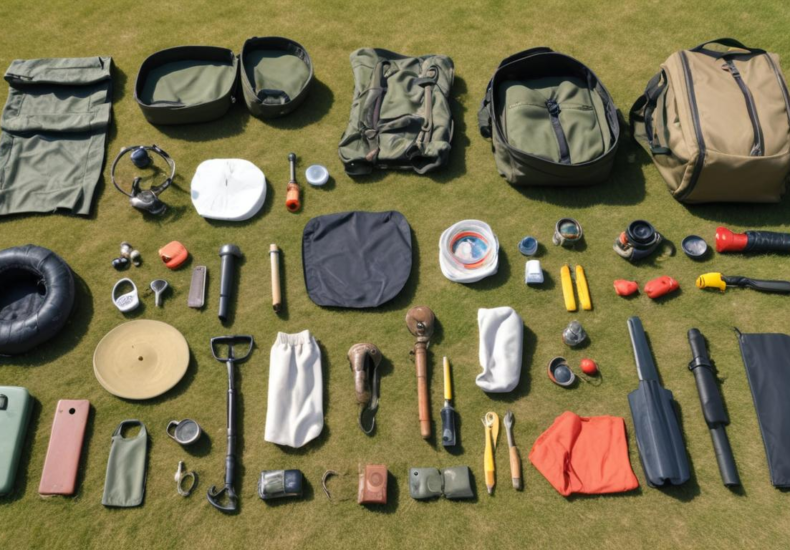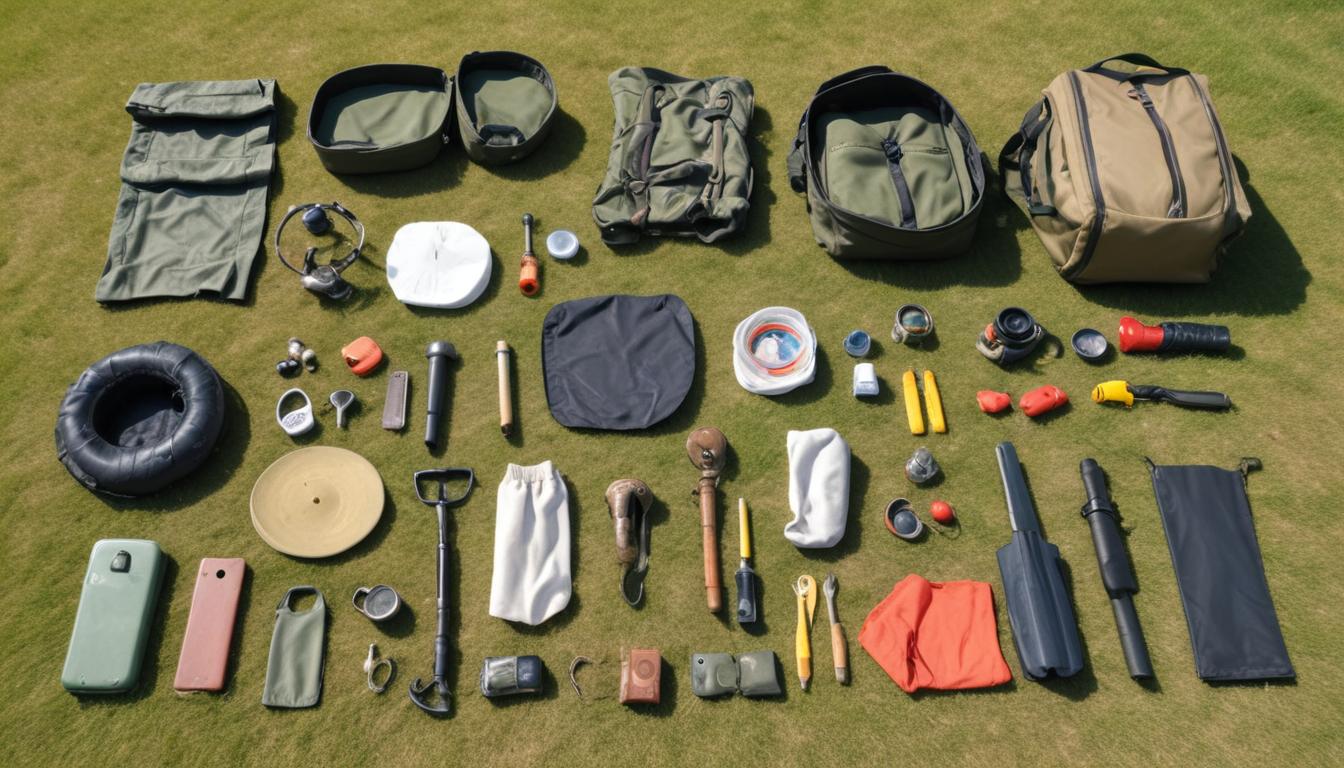
What to pack for a metal detecting vacation
When preparing for a metal detecting vacation, ensuring you have the right gear on your trip checklist is crucial to making your adventure both successful and enjoyable. The core of your equipment should definitely include a high-quality metal detector suited to your specific type of hunting, whether that be for relics, coins, or gold. Opt for a model that balances sensitivity and selectivity with user-friendliness, particularly if you are not very experienced.
Alongside your metal detector, a pinpointer is indispensable. This hand-held device helps to narrow down the exact location of your find, reducing digging time and minimizing disruption to the surrounding area. Additionally, don’t forget to pack extra batteries or a charging pack for both your metal detector and pinpointer, since running out of power can prematurely end your day’s search.
Headphones are another critical piece of gear. They can help you hear the subtle differences in the detector’s tones, which are easy to miss with external noise. It’s best to go for waterproof and noise-canceling models to enhance your ability to detect in various conditions.
Consider also the transportation of your equipment. A sturdy carrying bag or a backpack can protect your metal detector and accessories from physical damage and the elements while you’re on the move. Make sure it has enough compartments and padding to safely store all your tools.
Lastly, it’s wise to include a finds pouch or a utility belt with sections for storing discovered items and trash separately. Keeping the area clean from metallic debris not only protects the environment but also respects local regulations and the metal detecting community.
Clothing and accessories for different weather conditions
When packing for a detecting vacation, carefully considering the clothing and accessories you will need for various weather conditions is crucial. The type of clothes you choose can significantly impact your comfort and efficiency while exploring and detecting in different environments. For warm climates, it is essential to have lightweight, breathable clothing that keeps you cool while protecting you from the sun. Look for garments made from moisture-wicking fabrics to ensure that sweat doesn’t keep you uncomfortably damp during your activities.
Long-sleeved shirts and long pants made from UV-protective fabric are particularly advantageous, as they guard against sunburn while allowing ample air circulation. Remember to include a broad-brimmed hat to shield your face and neck, and consider UV-blocking sunglasses to protect your eyes from harsh sunlight. In contrast, for colder environments, layering is key. Start with a base layer that sits snug against your skin, preferably made from merino wool or a synthetic material designed to keep moisture away. Add an insulating mid-layer, such as a fleece or a lightweight down jacket, and top it off with a waterproof and windproof outer layer.
Footwear also varies depending on terrain and weather. Waterproof boots with good ankle support are essential if you’re planning to metal detect in wet or muddy conditions. In dry, sandy areas, lighter shoes may be preferable for comfort and ease of movement. Regardless of the specific style, ensure your footwear has a solid grip to handle diverse landscapes safely.
Accessories like gloves and knee pads will also enhance your trip checklist. Gloves protect your hands not only from dirt and potential cuts during digging but also from extreme temperatures, whether hot or cold. Knee pads, on the other hand, can make prolonged kneeling significantly more comfortable and prevent bruises or scrapes.
Packing the correct clothing and accessories can make a significant difference in your overall experience on a metal detecting trip. Ensuring you are prepared for any weather condition not only adds to your comfort but also extends your ability to stay out in the field, potentially leading to more exciting discoveries and a successful venture. By including these items in your gear, you are setting the stage for an enjoyable and rewarding adventure.
Tools and equipment for digging and sifting
For those who venture out on a metal detecting vacation, having the right tools and equipment for digging and sifting is essential. This includes an array of items designed to facilitate the recovery and handling of your finds, minimizing damage to both the items and the environment.
A durable, sharp-edged digging tool is at the top of your trip checklist. Options include small hand trowels for light soil, and heavier duty shovels for tougher terrain. Shovels with a serrated edge can be particularly useful for cutting through dense root systems or hardened soil. Additionally, a hand scoop can be invaluable for sifting through loose sand quickly, especially on beach outings.
For a more meticulous excavation, consider a set of sieves. These allow you to filter out finer soil and debris, leaving behind potentially smaller artifacts that might be missed otherwise. Sieves come in various mesh sizes; selecting a few in different grades can provide more flexibility depending on the soil composition and the size of the items you are searching for.
Beyond these basics, specialized knives and probes can also enhance your toolkit. A soil knife or hori-hori tool, originally designed for gardening, is ideal for more intricate work around sensitive objects. Its serrated edge and measuring marks make it an excellent tool for metal detecting enthusiasts who need precision. A metal detecting probe, slender and metal-tipped, helps in pinpointing objects in the dirt without excessive digging or damage.
It’s also worthwhile to pack a brush or two of varying stiffness. Soft brushes can be used to clean dirt from more delicate finds, while stiffer brushes might be necessary to remove mud or clay. Remember to use them cautiously to avoid scratches or other damage to your discoveries.
While these tools are necessary for the practical aspect of uncovering artifacts, don’t overlook their impact on your gear load. Lightweight, compact tools are preferable for longer treks or if you have a lot to carry; multi-use tools can also reduce the number of items you need. Ensuring everything fits well into your gear bag with your metal detector and other essentials will keep you organized and ready for whatever treasures you might find during your detecting vacation.
Safety and first aid essentials

When it comes to your safety and ensuring prompt, effective response to any minor injuries or health issues, a well-stocked first aid kit is a non-negotiable item on your trip checklist for a metal detecting vacation. It’s wise to customize your first aid kit based on where you’ll be detecting and for how long, but there are several essentials that should be included no matter the location.
Start with the basics; adhesive bandages in various sizes, sterile gauze pads, adhesive tape, and scissors. These can handle most minor cuts or abrasions. Include tweezers which are useful not just for splinter removal but can also aid in removing small pieces of debris from your discoveries. Antiseptic wipes and antibiotic ointment are important for preventing infection, and a packet of sterile saline is useful for washing out dirt or debris from eyes or wounds.
Pain relief medication, such as ibuprofen or acetaminophen, should be packed to manage headaches or minor pains, which can be common after long hours of bending and digging. Consider including antihistamines if you’re susceptible to allergies, especially in environments with high pollen or dust. Aloe vera gel or burn cream can provide relief from sunburn, which is a real risk if you spend long hours outdoors.
It’s also crucial to prepare for possible strains or sprains given the physical nature of metal detecting. Elastic bandages or a wrap can support sore muscles and joints. If you’re going to be in remote areas, adding a splint or a sling to your kit might be advisable.
Hydration salts or electrolyte tablets are essential additions, especially in warm or tropical climates where dehydration can occur quickly. While it’s best to avoid any major issues by staying well hydrated, having a backup in your medical kit is wise. Furthermore, sunblock and insect repellent are safety essentials that also serve to prevent discomfort and health issues on your trip.
Lastly, if you have any personal medications or medical devices, such as asthma inhalers or epinephrine pens, make sure these are part of your gear. It’s important to have an adequate supply for the duration of your trip, plus a little extra in case of delays.
Ensuring your safety gear and first aid essentials are carefully packed and easily accessible can significantly influence the quality and safety of your detecting vacation. Accidents happen, but being prepared can mean the difference between a minor hiccup and a trip-ending incident. This proactive approach allows you to enjoy your adventure with added peace of mind.
Tips for packing effectively and efficiently
To ensure you pack effectively and efficiently for your detecting vacation, consider adopting a strategic approach to what you bring along. Begin by listing all the items on your trip checklist based on their necessity and use during the trip. This will not only help you to remember everything but also to prioritize items in case you need to reduce your load.
When packing your gear, use a layering strategy. Place items that you will use frequently on top, and those you might only need occasionally on the bottom. Protective cases and bags with multiple compartments can help organize your items and protect them from damage due to shaking or impact during travel.
Another smart packing method involves grouping items by function. For example, keep all your digging tools together and your first aid essentials in another specific compartment. This not only makes it easier to find what you need quickly but helps in managing space more effectively.
Maximize space by using vacuum-seal bags for clothing, which can drastically reduce the volume they occupy. This is especially useful for bulkier items like jackets or sweaters that are essential but take up significant space. Consider rolling other clothing items instead of folding as this method often occupies less space and also reduces wrinkling.
For the electronic components of your gear, such as metal detectors, GPS devices, or batteries, ensure they are adequately protected against moisture and padding. Waterproof containers and anti-static bags can provide an extra layer of protection for these sensitive items against the elements and potential shocks.
Lastly, always leave a little extra space for items you may find or want to bring back. It’s common to come across fascinating relics or unique trinkets that you’ll want to add to your collection. Having a bit of additional room will save you from the hassle of arranging for shipping or worse, having to leave behind something valuable or sentimental.
By following these tips for packing effectively and efficiently, you can ensure you have all necessary tools at your disposal during your detecting vacation without overloading. Properly organizing your gear can lead to a more enjoyable and productive outing, letting you focus on the thrill of the hunt rather than the frustration of digging through an overstuffed bag.
You may also like
Archives
Calendar
| M | T | W | T | F | S | S |
|---|---|---|---|---|---|---|
| 1 | 2 | 3 | 4 | |||
| 5 | 6 | 7 | 8 | 9 | 10 | 11 |
| 12 | 13 | 14 | 15 | 16 | 17 | 18 |
| 19 | 20 | 21 | 22 | 23 | 24 | 25 |
| 26 | 27 | 28 | 29 | 30 | 31 | |
Leave a Reply